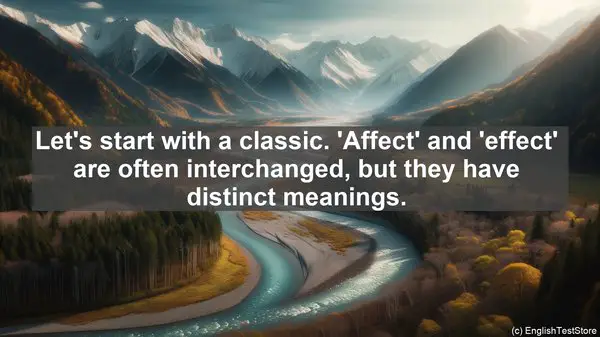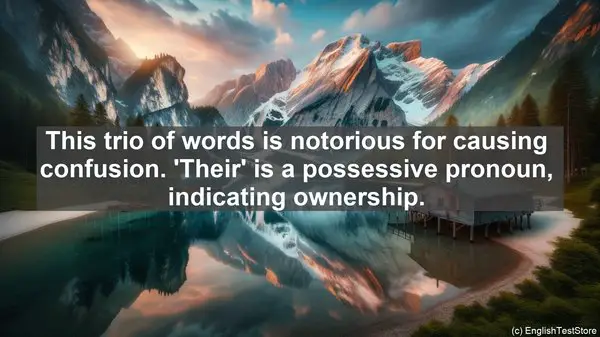Introduction
Today, we are going to dive into the fascinating world of words. Throughout history, language has evolved, and with it, the meanings and usage of certain words. In this lesson, we will explore the top 10 commonly confused words in history. By the end, you’ll have a better grasp of these words and be able to use them correctly in your own writing and conversations.
1. Affect vs. Effect
Let’s start with a classic. ‘Affect’ and ‘effect’ are often interchanged, but they have distinct meanings. ‘Affect’ is usually a verb, meaning to influence or produce a change. On the other hand, ‘effect’ is typically a noun, referring to the result or consequence of an action. Remember, ‘affect’ is the action, while ‘effect’ is the end result.

2. Their vs. There vs. They’re
This trio of words is notorious for causing confusion. ‘Their’ is a possessive pronoun, indicating ownership. ‘There’ is an adverb, indicating a place or position. And ‘they’re’ is a contraction of ‘they are.’ To avoid mix-ups, remember that ‘their’ shows possession, ‘there’ refers to a place, and ‘they’re’ is a shorter way of saying ‘they are.’
3. Your vs. You’re
Another common mix-up is between ‘your’ and ‘you’re.’ ‘Your’ is a possessive pronoun, showing ownership. On the other hand, ‘you’re’ is a contraction of ‘you are.’ To differentiate, ask yourself if you can replace the word with ‘you are.’ If the sentence still makes sense, then ‘you’re’ is the correct choice.
4. Its vs. It’s
The difference between ‘its’ and ‘it’s’ lies in the apostrophe. ‘Its’ is a possessive pronoun, indicating ownership. On the other hand, ‘it’s’ is a contraction of ‘it is’ or ‘it has.’ To determine the correct usage, ask yourself if you can replace the word with ‘it is’ or ‘it has.’ If the sentence still makes sense, then ‘it’s’ is the right choice.

5. Then vs. Than
While they may sound similar, ‘then’ and ‘than’ have different meanings. ‘Then’ is an adverb, indicating a specific time or sequence. On the other hand, ‘than’ is a conjunction, used to compare two things. To remember the difference, think of ‘then’ as relating to time, and ‘than’ as relating to comparison.
6. To vs. Too vs. Two
This trio of words is often mixed up due to their similar spellings. ‘To’ is a preposition, indicating direction or purpose. ‘Too’ is an adverb, meaning also or excessively. And ‘two’ is the number 2. To differentiate, remember that ‘to’ is used for direction, ‘too’ is used for excess, and ‘two’ is the number.
7. Complement vs. Compliment
These words may sound alike, but their meanings are quite different. ‘Complement’ is a noun or verb, indicating something that completes or enhances. On the other hand, ‘compliment’ is a noun or verb, indicating praise or admiration. To remember, think of ‘complement’ as something that completes, and ‘compliment’ as something nice someone says.
8. Accept vs. Except
The difference between ‘accept’ and ‘except’ lies in just one letter, but it’s crucial. ‘Accept’ is a verb, meaning to receive or agree to something. On the other hand, ‘except’ is a preposition or conjunction, indicating exclusion or omission. To avoid confusion, remember that ‘accept’ means to receive, while ‘except’ means to exclude.
9. Principal vs. Principle
These words are often misused, but they have distinct meanings. ‘Principal’ is a noun, referring to the head of a school or an important person. On the other hand, ‘principle’ is a noun, indicating a fundamental truth or belief. To differentiate, think of the ‘pal’ in ‘principal’ as someone you know, while ‘principle’ is a general belief.
10. Stationary vs. Stationery
Our final pair of words is ‘stationary’ and ‘stationery.’ ‘Stationary’ is an adjective, meaning not moving or still. On the other hand, ‘stationery’ is a noun, referring to writing materials. To remember, think of the ‘a’ in ‘stationary’ as standing for ‘at rest,’ while ‘e’ in ‘stationery’ stands for ‘envelope’ or ‘letter.’
